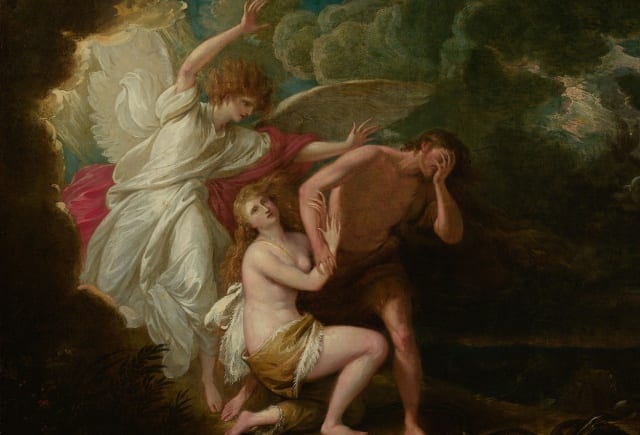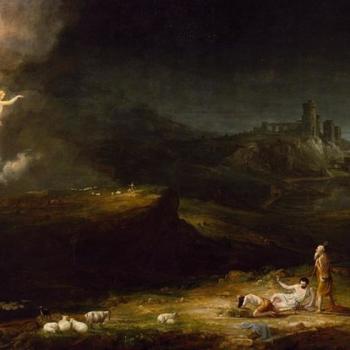
The following is a rather lengthy response I made to a Muslim friend who sent what I believe was an online pamphlet of sorts from a Dawah site, comparing Christian and Muslim beliefs, and I figured I would post it for the sake of general reference, because some aspects of it rang true to our beliefs, but others were a rather simplistic reading of Christian theology. My apologies if I’m just repeating what I’ve already said a bunch of times before. Also, bear in mind this is coming from a mainly Catholic perspective.
As I have gone into before, our understanding of “sin” is not just bad things that we do, but rather the twistedness of our natures that causes us to have a “downward spiral” towards those bad things, an imbalance between flesh and spirit which causes corrupted or inordinate desires and attachments. We shared a primal union with the divine, the symbolic “Garden of Eden,” but we sought to be our own gods and decide for ourselves what was good and what was evil. The weight of this condition of sin we share in common with our archetypal first parents, as well as the personal sins we commit in our own lives, separates us from Him.
Just to clarify, we *are not* responsible for the sins of others on a personal level, but we are share in common a fallen nature, weakened and wounded, separated from the perfection of God. That is what Original or Ancestral sin is really about at its core. It’s not just about Adam, as an individual, but rather Adam as a stand in for the entire human race which is caught in the grips of this grave illness and stands in need of divine restoration. It is that which we believe needs to be addressed on a root level, through the drama of salvation we believe unfolds in history through Jesus Christ.
On the subject of whether babies come into the world “in sin”, the point is human beings have the propensity for sin, and that’s inherently a part of us. That’s what it means, not that babies have committed any personal sins. Let me put it this way: human beings have the capacity to do various things which they are not doing at every stage of life. But that inherent capacity is still there at all stages of life, and in a spiritual context, the condition of sin within humanity is an inherent draw towards the dark side which Christians believe needs to be healed and set aright through supernatural grace present through Christ and His sacraments.
All this having been said, I believe that Christians and Muslims actually largely agree with each other on the issue of God’s reaction to personal sins. It should be noted that Christians believe that, before the time of Christ, the souls of the just went to a section of “sheol”, a waiting place, but were not suffering condemnation, even though they could not realize the fullness of union within the divine life. I like the symbol of the curtain in the Temple of Jerusalem which separates God and Man. It’s not that God did not listen to those praying from beyond the curtain, but there was still a barrier to the fullness of union.
We would both concur that those who repent with a sincerity of conscience will be forgiven, and that God is the perfect judge of hearts. But this is a different matter from the condition of sin, which needs to be dealt with in a specific way, according to the divine plan. This is why we see the curtain in the Temple tearing down the center at the crucifixion of Jesus. Its a symbol that God has drawn mankind into the supernatural divine life through condescending to live a human life and die a human death, bearing the full weight of the sins of the world upon Him and unleashing oceans of divine grace.
I’m honestly a bit confused why the crucifixion would be seen as divine suicide by the pamphlet writers, since it’s pretty obvious that Christ is put to death by evil men, and yet at the same time he lays his life down in accordance with the Father’s will, just as martyrs do. That’s very different from killing oneself. The Father, in His omnipotence, foresaw that Christ would indeed suffer and die, and it was all a part of God’s plan to bring about the redemption of humanity from the grips of the condition of sin. But that doesn’t mean the people who killed Christ were not free agents. They *could* have acted differently, but chose paths of wickedness, which brought about the crucifixion.
Again, all of this is within God’s omniscience and providence, but it is far from being a suicide. A sacrifice, yes, but not a suicide. Also, for me it is more a demonstration of the “weight of sin” that we see manifesting upon the cross. He bears that weight, and it kills Him, yet this very thing is what ultimately breaks the strength of it and allows frail human beings to enter fully in the mystery of the divine life. This is what it means to be a Christian. “If any man be in Christ, He is a new creation; the old has passed away, behold, the new has come.”
The pamphlet questions why God would want to take upon Himself the consequences of His own justice, to bear upon Himself the wages of sin, though He is sinless. In a word…I would say Love. Although this is a relatively simplistic analogy, I am going to use it for a purpose: suppose a judge casts sentence upon people, and out of justice, cannot simply dispel with the sentence, but out of mercy, decides that he will step down from his judge’s seat, and somehow take that very sentence?
Please bear with me, as I don’t want that to be taken too literally, in the sense that all of us deserve to be crucified. But the point is that our very condition of being spiritually separated from God is something that Christ underwent to the nth degree upon the Cross, when He cried out “My God, My God, why hast Thou forsaken Me?” He went down to the very darkest points of human God-forsakenness to draw us into the essence of the divine, and I personally would say Trinitarian, life. Because that, to me, is what the Trinity is, and ultimately what the Incarnation is. It is that quality of God which draws us ever up into His very dynamism.
I know there are some nuances within difficult schools of thought in Islam, as well as Judaism, but I do not believe it is typical, outside of some mystical circles, to believe that humanity being divinized is even something to be sought after. The goal, as I understand it, is submission to God…and from a Christian perspective, that’s a very solid groundwork to build on. But the end game of our tradition, I would say, goes far beyond that, in that through Christ we actually believe we have been adopted in the actual familial life of God. So we are not only creatures of God, but children of God. We are not only trying to follow His commands, but also to actually enter into the life of grace which Catholics believe come from the sacraments, and connect us to the interior workings of the divine life. We become the very Body of Christ in this world.
This differs from the primal sin of Adam and Eve, which consists of grasping at equality with God, and instead emulates Christ who undid it by not equating equality with God a thing to be grasped at, but rather emptied Himself, taking the form of a slave. In the end it all comes down to how much we are willing to pour ourselves out. I see this in aspects of Islamic tradition and stories, with the emphasis upon humility and charity, which are two sides of the coin of giving of self. But within Christianity, in light of the Christ, we take this to its farthest point with the concept of God Himself emptying out and becoming small and despised, more like a worm than a man, so that the forces of evil will be undone. This is the nature of Divine Kenosis, and I would argue, the very heart of Christian hope.
With regards to striving and repenting, which was addressed in the pamphlet as something Christians see no need to do…I must reply in the firm negative, as we Christians most certainly do believe in that as integral to our salvation. Although there have been some heresies to the contrary, historical Christianity, and an honest reading of both the Scriptures and the Early Church Fathers makes it clear that faith *and* works must be held together in unison, and indeed good works are believed to the fruits of living a life in union with and in imitation of Christ. We are told to work out our salvation in fear and trembling, and that if we love Christ, we must de facto strive our utmost to keep His commandments.
Furthermore, I would add that we believe any truly good work must have its origin in God, and the impulse to do those good works is written on our hearts through Natural Law. So there’s really no getting away from it for us. If we do not bear good fruit, according to the parables of Jesus, we will be cut down, and the sheep and the goats will be divided at the Last Judgment according to their deeds. So no, the crucifixion is not some golden ticket to heaven, but rather a key by which we can enter into divine mysteries and learn how to live according to the supernatural life and the imitation of Christ. In essence, we are “saved” in the sense of Christ’s salvific work, “being saved” in the sense of our daily struggles to live in the state of grace, and “hoping to be saved” in the final sense of persevering to the end.
With regards to the purpose of the crucifixion ostensibly failing because there is still sin and evil in the world and the underworld, my response would be that Christ died so that those who repented and embraced the message of the Gospel might live according to the divine life. That’s what Christians believe, and what so many of us have gone to our deaths over down through the centuries. We hope that our souls are given new life, just as Jesus rose from the dead. This, however, does not mean that there would be no more sin in the world, nor that the process of resurrection has been completed. We are all in a process of becoming, and what is to come, eye has not seen and ear has not heard. We all carry our own crosses, in this jagged-edged world full, and are called to unite all our sufferings to Christ’s Passion. In this way, we are fully in union with Him, and even our smallest taste of Passion becomes redemptive.
With regards the cross not being wisdom, I would respond in the words of St. Paul, that the foolishness of God is wiser than man’s wisdom, and the weakness of God is stronger than man’s strength. That is the mystery of the faith, which I do not believe is supposed to be acceptable to the mind, but rather meant to expand our minds and hearts beyond their human capacity. We are meant to be broken beyond our bounds, and torn through, like the temple curtain was torn through. We are meant to be pierced, as Christ was pierced, and as such grow smaller, and greater, at the same time.












